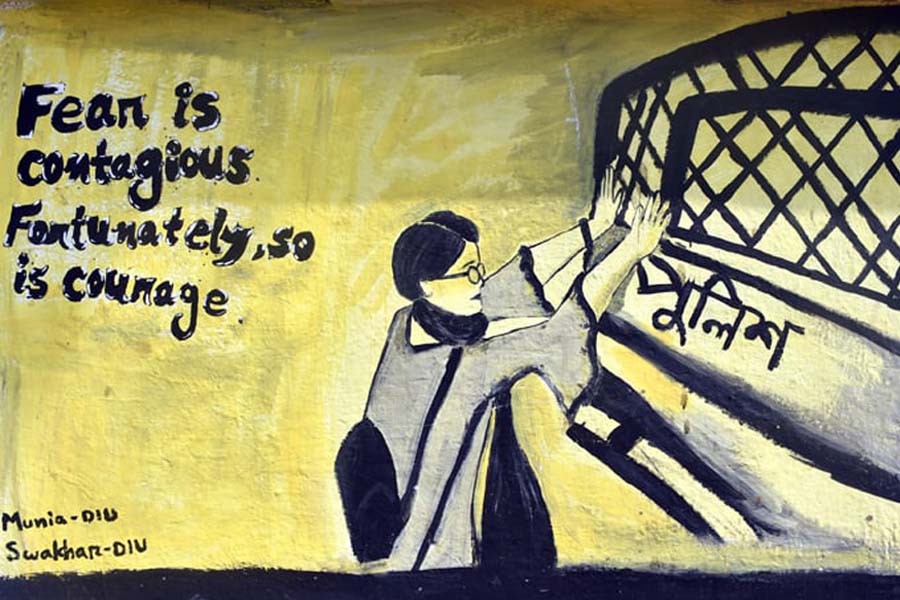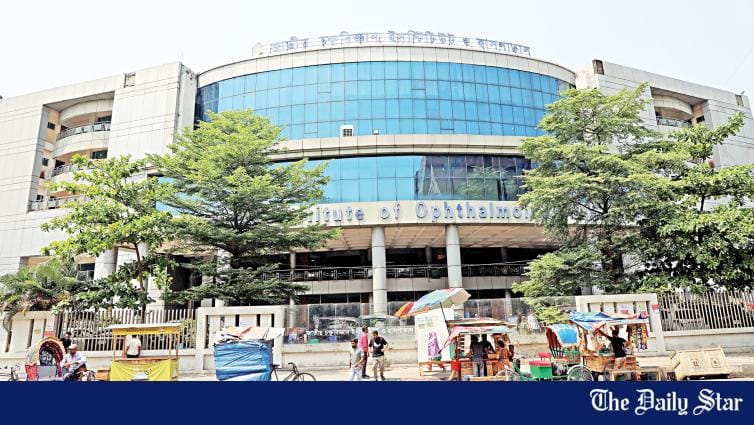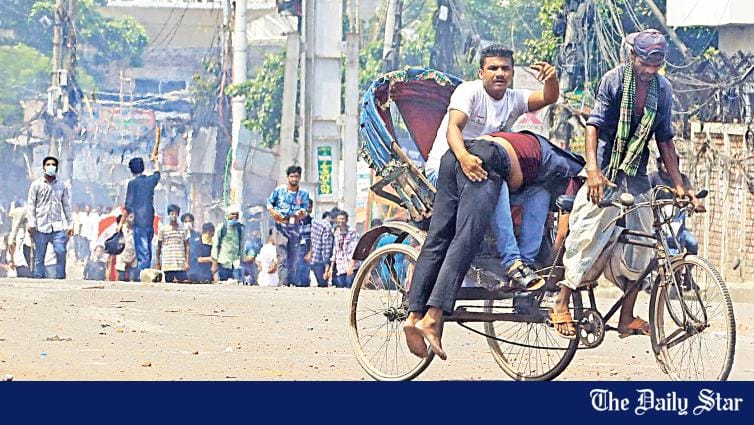Saif
Senior Member
- Messages
- 14,634
- Reaction score
- 7,628
- Origin

- Residence

- Axis Group

- Copy to clipboard
- Thread starter
- #21

July massacre and the BBC documentary
Hasina’s loyalists practically worshipped her for worldly gains. Some called her Jewel of the Nation, others called her daughter of democracy, mother of humanity
July massacre and the BBC documentary
Mohiuddin Ahmad
Published: 11 Jul 2025, 18: 19

Party goons and the law enforcement cracked down most brutally and cruelly to suppress the movement File Photo
Sheikh Hasina is the daughter of Bangladesh’s founding president Sheikh Mujib. Mujib ruled the country for three and a half years. The legacy of authoritarian governance in this country began with him. When his popularity fell to the nadir, he was killed by the military. Hasina ruled for twenty and a half years. In many respects, she followed in her father's footsteps. In others, she surpassed him. She took authoritarian rule to its peak. Eventually, she too fell. She fled for her life. And in doing so, she symbolically killed her father a second time. This will remain as a lasting example.
Hasina’s loyalists practically worshipped her for worldly gains. Some called her "Desh Ratna" (Jewel of the Nation), others called "the daughter of democracy". Some dubbed her "the daughter of language", others hailed her as "the mother of humanity". She patronised certain intellectuals and assigned them to rewrite the narrative of independence. Several political parties, large and small, staged movements against Hasina’s government. Her followers harassed many of them, beating, jailing, disappearing and even killing some.
The students had wanted quotas reformed, brought to a reasonable level. Hasina, in a piece of political showmanship, scrapped the entire system.
It would have been wise to stop there, yet Hasina’s mind was always teeming with evil ploys
It has seemed unimaginable at the time that Hasina would not remain prime minister during her lifetime or that Khaleda Zia would ever live a free life again. But that is exactly what happened on 5 August 2024.
During Hasina’s time, political parties did stage movements, but for various reasons they failed to draw the public in.
Those protests were basically cadre driven. People had lost interest in, and grown weary of, conventional, old style politics. Even so, we witnessed a few movements in which ordinary citizens did join wholeheartedly. None of these were aimed at toppling the government, nor were they carried out under any party banner, although they enjoyed the sympathy and support of many parties and saw large numbers of their activists take part.
The 'Safe Roads' movement is a good example. It reflected the aspirations of everyday citizens. In its final phase, the government’s thugs descended on the protesters, the “helmeted” men whose photos and footage we all saw in the news.
Then came the quota reform movement, which came in three phases. The first two stirred general students but stalled before they could go far, each time tripping up when the government-backed student front Bangladesh Chhatra League (BCL) swooped down on the campus. Hasina’s model for crushing protests went like this: students demonstrate, BCL cadres attack, beating them and driving them off campus. If that fails, money, intelligence operatives, and pet journalists spread disinformation to sow divisions, and in time the movement fizzles out. But in the third phase that formula did not work.
Ironically, the movement ignited because of the government’s over manipulation. After the second phase, it issued a circular abolishing all quotas in public recruitment, something the students had not asked for. The students had wanted quotas reformed, brought to a reasonable level. Hasina, in a piece of political showmanship, scrapped the entire system.
It would have been wise to stop there, yet Hasina’s mind was always teeming with evil ploys.
She kept the opposition perpetually on the run, manufacturing issues where none existed and pouncing on them. Her language was intemperate, crude and insolent, and she lacked the finesse, learning, or interest to grasp the consequences. No one dared advise her. She hand picked flatterers as “advisers”, glorified servants of her whims.
A writ was then filed in court to restore the quotas. This was an old ploy. Hasina sought to play her dirty game using the judiciary, just as she had earlier got the caretaker government clause of the constitution struck down to fulfill her own designs. She knew that once that clause was gone, she could stay in power indefinitely, and there was no shortage of servile judges. This time, though, the plan misfired. Students and job seekers erupted in fury. Under the banner of the "Anti Discrimination Student Movement", the protest spread nationwide.
The regime returned to its standard tactics. First the hired helmet goons beat up the students, drove them from the halls, and launched armed attacks in the streets.
The BBC documentary is very professional. The footage of police savagery in Jatrabari is hair raising. With similar investigation the attacks in Badda, Mohammadpur, Uttara and elsewhere could be documented just as vividly, and that is only Dhaka. There were many such assaults across the country.
For the first time students from public and private universities, madrasas, and even schools and colleges stood shoulder to shoulder. The movement spilled beyond campuses. Police, RAB and BGB were then deployed. Helmeted thugs assaulted protesters while the security forces stood by shielding the attackers until the forces themselves declared war on the demonstrators. But nothing worked. As public participation swelled it turned into a full blown mass uprising and the Hasina government fell.
Hasina felt no sense of duty either to country or to party. Within the party she had created a league of her relatives, comprising solely family and close kin. After spiriting them to safety, she finally bolted. Never in the nation’s history has there been such a selfish and dishonourable exit.
The brutality unleashed by ruling party goons and the security forces surpassed every limit. Because of sundry restrictions much of it never reached the mainstream media. People had to rely on social platforms, on which Hasina also cracked down. By shutting down telecommunication and the internet, she turned the country into a giant prison.
Even a curfew could not stem the tide of furious students and citizens in the streets. It was the state’s most savage war on unarmed people, reminiscent of 1971. A recent BBC documentary on the July 2024 movement reveals some of that savagery, especially the police atrocities in Jatrabari. Leaked call records show that Hasina herself ordered police to use lethal weapons. Such barbarity is unthinkable without a top level political order, and that leak now stands as documentary proof.
Meanwhile, some of Hasina’s relatives and cronies hiding at home and abroad, are claiming that it was all fabricated with AI, that the BBC is a British imperialist tool, that the entire movement was an American conspiracy. Her gifted son has “identified” the leaked voice as a 2016 phone call. Hasina’s slaves are busy spreading the story.
One is reminded of the uproar over “mid night voting” in the 2018 election: certain sycophant journalists insisted it was a lie, insisting “Do you have any proof, any photo, any video?” Yet the recently arrested former Chief Election Commissioner Nurul Huda has now admitted in court that the voting was indeed done at night.
The BBC documentary is very professional. The footage of police savagery in Jatrabari is hair raising. With similar investigation the attacks in Badda, Mohammadpur, Uttara and elsewhere could be documented just as vividly, and that is only Dhaka. There were many such assaults across the country. At Jahangirnagar and Rajshahi universities ruling party thugs turned campuses into hell. Many people everywhere recorded these scenes; everyone now carries a phone. Nothing can stay hidden for long.
* Mohiuddin Ahmad is a writer and researcher.
Mohiuddin Ahmad
Published: 11 Jul 2025, 18: 19
Party goons and the law enforcement cracked down most brutally and cruelly to suppress the movement File Photo
Sheikh Hasina is the daughter of Bangladesh’s founding president Sheikh Mujib. Mujib ruled the country for three and a half years. The legacy of authoritarian governance in this country began with him. When his popularity fell to the nadir, he was killed by the military. Hasina ruled for twenty and a half years. In many respects, she followed in her father's footsteps. In others, she surpassed him. She took authoritarian rule to its peak. Eventually, she too fell. She fled for her life. And in doing so, she symbolically killed her father a second time. This will remain as a lasting example.
Hasina’s loyalists practically worshipped her for worldly gains. Some called her "Desh Ratna" (Jewel of the Nation), others called "the daughter of democracy". Some dubbed her "the daughter of language", others hailed her as "the mother of humanity". She patronised certain intellectuals and assigned them to rewrite the narrative of independence. Several political parties, large and small, staged movements against Hasina’s government. Her followers harassed many of them, beating, jailing, disappearing and even killing some.
The students had wanted quotas reformed, brought to a reasonable level. Hasina, in a piece of political showmanship, scrapped the entire system.
It would have been wise to stop there, yet Hasina’s mind was always teeming with evil ploys
It has seemed unimaginable at the time that Hasina would not remain prime minister during her lifetime or that Khaleda Zia would ever live a free life again. But that is exactly what happened on 5 August 2024.
During Hasina’s time, political parties did stage movements, but for various reasons they failed to draw the public in.
Those protests were basically cadre driven. People had lost interest in, and grown weary of, conventional, old style politics. Even so, we witnessed a few movements in which ordinary citizens did join wholeheartedly. None of these were aimed at toppling the government, nor were they carried out under any party banner, although they enjoyed the sympathy and support of many parties and saw large numbers of their activists take part.
The 'Safe Roads' movement is a good example. It reflected the aspirations of everyday citizens. In its final phase, the government’s thugs descended on the protesters, the “helmeted” men whose photos and footage we all saw in the news.
Then came the quota reform movement, which came in three phases. The first two stirred general students but stalled before they could go far, each time tripping up when the government-backed student front Bangladesh Chhatra League (BCL) swooped down on the campus. Hasina’s model for crushing protests went like this: students demonstrate, BCL cadres attack, beating them and driving them off campus. If that fails, money, intelligence operatives, and pet journalists spread disinformation to sow divisions, and in time the movement fizzles out. But in the third phase that formula did not work.
Ironically, the movement ignited because of the government’s over manipulation. After the second phase, it issued a circular abolishing all quotas in public recruitment, something the students had not asked for. The students had wanted quotas reformed, brought to a reasonable level. Hasina, in a piece of political showmanship, scrapped the entire system.
It would have been wise to stop there, yet Hasina’s mind was always teeming with evil ploys.
She kept the opposition perpetually on the run, manufacturing issues where none existed and pouncing on them. Her language was intemperate, crude and insolent, and she lacked the finesse, learning, or interest to grasp the consequences. No one dared advise her. She hand picked flatterers as “advisers”, glorified servants of her whims.
A writ was then filed in court to restore the quotas. This was an old ploy. Hasina sought to play her dirty game using the judiciary, just as she had earlier got the caretaker government clause of the constitution struck down to fulfill her own designs. She knew that once that clause was gone, she could stay in power indefinitely, and there was no shortage of servile judges. This time, though, the plan misfired. Students and job seekers erupted in fury. Under the banner of the "Anti Discrimination Student Movement", the protest spread nationwide.
The regime returned to its standard tactics. First the hired helmet goons beat up the students, drove them from the halls, and launched armed attacks in the streets.
The BBC documentary is very professional. The footage of police savagery in Jatrabari is hair raising. With similar investigation the attacks in Badda, Mohammadpur, Uttara and elsewhere could be documented just as vividly, and that is only Dhaka. There were many such assaults across the country.
For the first time students from public and private universities, madrasas, and even schools and colleges stood shoulder to shoulder. The movement spilled beyond campuses. Police, RAB and BGB were then deployed. Helmeted thugs assaulted protesters while the security forces stood by shielding the attackers until the forces themselves declared war on the demonstrators. But nothing worked. As public participation swelled it turned into a full blown mass uprising and the Hasina government fell.
Hasina felt no sense of duty either to country or to party. Within the party she had created a league of her relatives, comprising solely family and close kin. After spiriting them to safety, she finally bolted. Never in the nation’s history has there been such a selfish and dishonourable exit.
The brutality unleashed by ruling party goons and the security forces surpassed every limit. Because of sundry restrictions much of it never reached the mainstream media. People had to rely on social platforms, on which Hasina also cracked down. By shutting down telecommunication and the internet, she turned the country into a giant prison.
Even a curfew could not stem the tide of furious students and citizens in the streets. It was the state’s most savage war on unarmed people, reminiscent of 1971. A recent BBC documentary on the July 2024 movement reveals some of that savagery, especially the police atrocities in Jatrabari. Leaked call records show that Hasina herself ordered police to use lethal weapons. Such barbarity is unthinkable without a top level political order, and that leak now stands as documentary proof.
Meanwhile, some of Hasina’s relatives and cronies hiding at home and abroad, are claiming that it was all fabricated with AI, that the BBC is a British imperialist tool, that the entire movement was an American conspiracy. Her gifted son has “identified” the leaked voice as a 2016 phone call. Hasina’s slaves are busy spreading the story.
One is reminded of the uproar over “mid night voting” in the 2018 election: certain sycophant journalists insisted it was a lie, insisting “Do you have any proof, any photo, any video?” Yet the recently arrested former Chief Election Commissioner Nurul Huda has now admitted in court that the voting was indeed done at night.
The BBC documentary is very professional. The footage of police savagery in Jatrabari is hair raising. With similar investigation the attacks in Badda, Mohammadpur, Uttara and elsewhere could be documented just as vividly, and that is only Dhaka. There were many such assaults across the country. At Jahangirnagar and Rajshahi universities ruling party thugs turned campuses into hell. Many people everywhere recorded these scenes; everyone now carries a phone. Nothing can stay hidden for long.
* Mohiuddin Ahmad is a writer and researcher.










